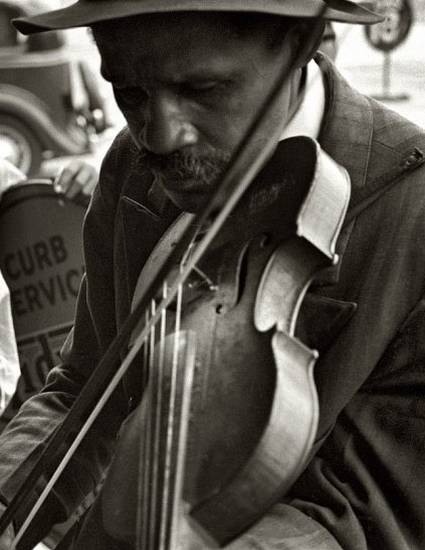
Contribution to Book
“The Farewell Waltz”: The Chatmon Family, the Mississippi Sheiks, and the Segregation of Sound
Mississippi Fiddle Tunes, Commercial and Informal Recordings, 1920-2018
(2021)
Abstract
The Mississippi Sheiks were perhaps the most commercially successful recording artists from Mississippi prior to World War II. Yet, they fit none of the stereotypes about country music or the blues. The off-shoot of a string band that catered to square dance audiences and the resort vacation crowd, the Sheiks displayed a marked tendency to perform and record country music, more than any popular country blues recording stars. Still their work drew favorable comments from many Mississippi musicians such as Houston Stackhouse and Son House, the second of whom even preferred their playing to that of Charley Patton. The Mississippi Sheiks’ recorded some of the most enduring and widely copied country blues melodies of the pre-war period, and the fact that each of the members were steeped in old time material—recording it and having more of it marketed to white audiences as hillbilly tunes than any other African Americans of the period—situates the Sheiks squarely inside the overarching theme of this book.
The professionalism of the Mississippi Sheiks as well as the group’s affinity for country music reflect the guiding influence of Alonzo (Lonnie) Chatmon, and his fiddle-playing shaped their sound as much as his opportunism paved the way for their success. It might have been the guitar playing of Walter Vinson that kept the group together for so long, but it was surely his patience and his singing too. In later interviews, Vinson offered fantastic tales of Lonnie’s musicianship. “He didn’t make no mistakes; he didn’t play no dischords…he was just a violin player. Got the record all the way through Mississippi…as the best violin-player.” The breadth of their repertoire, the reliable standards of musicianship, and the varied use of keys and rhythms was how the Sheiks caught the interest of their audience and sustained it. The songs, Jailbird Love Song and Yodeling Fiddling Blues, were no doubt influenced by the work of Meridian-native Jimmy Rodgers, but hokum blues such as Shake Hands & Tell Me Goodbye and She Ain't No Good (also done by Charlie McCoy) were obvious crowd favorites.
By examining liner notes, interviews, government documents, newspapers, and conducting some field research in the town of Bolton, Mississippi, this biography revolves around Alonzo Chatmon but it also illustrates the lived experiences and full breadth of the Chatmon family and the Mississippi Sheiks through the lives and careers of the eleventh oldest son of Henderson and Eliza Chatmon, Harry Chatmon, and a prodigious young musician by the name of Charlie McCoy.
From growing up on a farm near the small town of Bolton, marrying an older woman with several children, settling down to farming near Vicksburg, playing in a hotel orchestra in Jackson, recording for Okeh Records in Atlanta, and operating a café in Glen Allan, Mississippi, Alonzo was the Chatmon brother everyone looked to for leadership. While he was no doubt the leader of the Mississippi Sheiks, he had the foresight to recruit a pair of talented accompanists, Charlie McCoy and Walter Vinson, whose prodigious abilities and broad repertoires included blues, popular music, ballads, and old-time tunes.
Drawing on previously undiscovered interviews with Alonzo Chatmon’s older sister and younger brother, Josie and Larry Chatmon, this essay demonstrates that McCoy and Vinson developed their talents initially under the tutelage of fiddler and pianist Harry Chatmon, the youngest son of Henderson and Eliza Chatmon, whom the duo backed in a string band in the late 1920s. This essay argues, moreover, that the fiddle heard in the recordings of Alec Johnson and Chatman’s Mississippi Hot Footers are not Bo Carter, as previously believed, but rather Harry Chatmon, who remained employed as a musician in a hotel orchestra in Jackson throughout the Great Depression. The influence of Harry Chatmon on the music of the younger musicians, as well as Alonzo’s ability to recruit them away from his youngest brother, set the stage for the recording of all the old-time transcribed in this volume. While the decisions of record companies to limit African American artists to the blues seems to have dictated the nature of their releases after 1930, the diverse musical offerings of the Sheiks and their cohorts prior to 1931 demonstrate the sort of dynamic and rich musical traditions that developed out of the agency of African American string bands in Mississippi.
Keywords
- Fiddle,
- Mississippi,
- Chatmon Family,
- Mississippi Sheiks,
- Segregation of Sound
Disciplines
Publication Date
Winter November, 2021
Editor
Harry Bolick and Tony Russell
Publisher
University Press of Mississippi
Series
American Made Music Series
Citation Information
T. DeWayne Moore, "'The Farewell Waltz': The Chatmon Family, the Mississippi Sheiks, and the Segregation of Sound," in Mississippi Fiddle Tunes, Commercial and Informal Recordings, 1920-2018, eds. Harry Bolick and Tony Russell (Jackson, MS: University Press of Mississippi, 2021), 91-151.
Creative Commons License

This work is licensed under a Creative Commons CC_BY International License.
